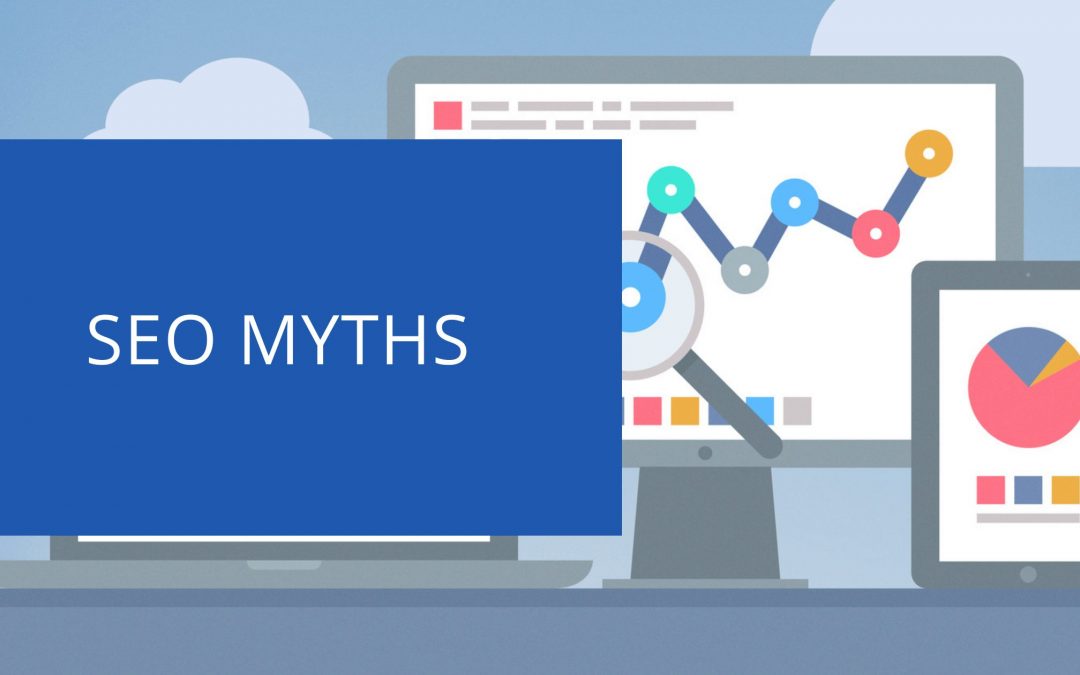Myths and misconceptions about SEO are widespread in the industry. The reality is that it’s not a thing, but instead an ever-changing process of optimising your website for web crawlers so you can rank higher on SERPs (search engine results pages). In this blog post, we will dispel 10 common myths surrounding search engine optimisation!
Contents
SEO Myths
Myth #01: SEO is Dead
This is perhaps the most popular myth about SEO- that it’s no longer effective and is on its way out. The reality is that search engine optimisation is more important than ever, with Google changing its algorithm over 500 times in the past year alone! If you’re not doing SEO, your website will fall behind your competitors who are.
Myth #02: You Need to Stuff Keywords Into Your Content
Another common misconception about SEO is that you need to stuff keywords to increase keyword density into your content to rank higher. This couldn’t be further from the truth! If you overdo it with your keywords, you’ll be penalised by Google. The best approach is to use natural language and include keywords where they make sense- not forcedly.
Myth #03: You Need to Optimise for All Keywords
 Another myth that people often believe is that they need to optimise for all possible keywords. This simply isn’t feasible or effective, trying to target too many keywords will dilute your efforts and could lead to lower rankings. Instead, focus on a handfull of high-traffic keywords that are relevant to your business and site.
Another myth that people often believe is that they need to optimise for all possible keywords. This simply isn’t feasible or effective, trying to target too many keywords will dilute your efforts and could lead to lower rankings. Instead, focus on a handfull of high-traffic keywords that are relevant to your business and site.
Myth #04: Social Media Has No Impact on SEO
Many people think that their social media presence has no impact on SEO. However, you can use social media to get backlinks by getting your content in front of a relevant audience. Social media platforms like Facebook, LinkedIn, and Twitter allow you to share your content with a larger audience, which can, in turn, lead to more backlinks.
Myth #05: You Can Only Rank Well If You Have an Ad Budget
A lot of businesses believe they can only rank well in SERPs if they spend money on advertising. The reality is that organic search engine traffic is still much cheaper than paid ads (and more effective) as long as you’re willing to put in some time and effort into growing your web presence organically through blogging, content marketing, guest posts, and social media.
Myth #06: You Need to Change Your Site’s Design to Rank Well
A lot of people believe that to rank well, they need to change their entire site design. The reality is that you only need to make a couple of small changes- such as adding an XML sitemap, improving your page speed, and ensuring your website is optimised for mobile devices.
Myth #07: SEO Is Complicated and Difficult
Some people think that SEO is too complicated for them to do themselves. However, this isn’t the case! There are plenty of free resources available online (such as this blog post) that will teach you everything you need to know about SEO. All it takes is a bit of time and effort to learn the basics.
Myth #08: SEO only Works on Big Brands
 A lot of people think that SEO only works for big brands with huge marketing budgets. However, this isn’t true! Small businesses can also benefit from SEO by targeting long-tail keywords and creating high-quality content.
A lot of people think that SEO only works for big brands with huge marketing budgets. However, this isn’t true! Small businesses can also benefit from SEO by targeting long-tail keywords and creating high-quality content.
Myth #09: It’s Impossible to Rank without Building Links
The first myth you’ll come across when it comes to SEO is that you need to build backlinks to rank well on Google. While this used to be the case, Google’s algorithm has changed so that backlinks are no longer as important. Now, other factors such as quality content, topical authority, and user engagement have become much more influential in SEO.
Myth #10: You will be penalized for duplicate content
Duplicate content occurs when identical or near-duplicate content appears in more than one location. It can be on the same website or different websites. Google has stated that there is no duplicate content penalty, while this is mostly correct, it is still widely spread.
Duplicate content won’t get you penalised but it can cause SEO issues such as The search results are often filled with undesirable URLs, keyword cannibalisation, wasted crawl budget.
SEO Myth FAQs
What is SEO?
SEO stands for “search engine optimisation” and it’s the process of growing your website in organic search results. By doing this, you can get more free traffic from Google to increase sales and grow your business. It takes some time, but if done correctly- you’ll see great ROI!
How much does SEO cost?
SEO can be significantly cheaper than other forms of online marketing such as PPC. However, it does require time and effort to do well- which is why companies with a limited budget hire an SEO company or consultant instead.
How long does it take for SEO to work?
It depends on the size of your website and how competitive your keywords are! It can take months before you see any significant results from organic search engine traffic.
What is backlinking?
 Backlinks are links that point to your website from other websites. These help you rank higher in Google search results and bring more free traffic to your site.
Backlinks are links that point to your website from other websites. These help you rank higher in Google search results and bring more free traffic to your site.
How do I find good keywords for my blog posts/SEO campaign?
Use tools like SEMrush , Moz Keyword Explorer, or Ahrefs’ Content Explorer tool (for full lists of keyword research tools, see this post ). Enter a keyword or phrase into the tool and it will show you all of the related keywords that you can target for your SEO campaign. You can also use Google’s Keyword Planner to find new keywords to target.
Can I do SEO myself?
Yes! There are plenty of free resources available online (such as this blog post) that will teach you everything you need to know about SEO. All it takes is a bit of time and effort to learn the basics. However, if you’re not sure where to start or would like help with your SEO campaigns, then consider hiring an SEO company or consultant.
We Offer SEO Services Nationwide
- Chester:https://mediakynect.co.uk/seo-chester/
- Wirral: https://mediakynect.co.uk/seo-wirral/
- Liverpool: https://mediakynect.co.uk/seo-liverpool/
- North Wales: https://mediakynect.co.uk/seo-north-wales/
- Wrexham: https://mediakynect.co.uk/seo-wrexham/
Conclusion
As you can see, there are a lot of misconceptions about SEO that can lead to businesses making costly mistakes. However, if you’re armed with the right information, it’s easy to avoid these traps and achieve great results with your SEO campaigns.

